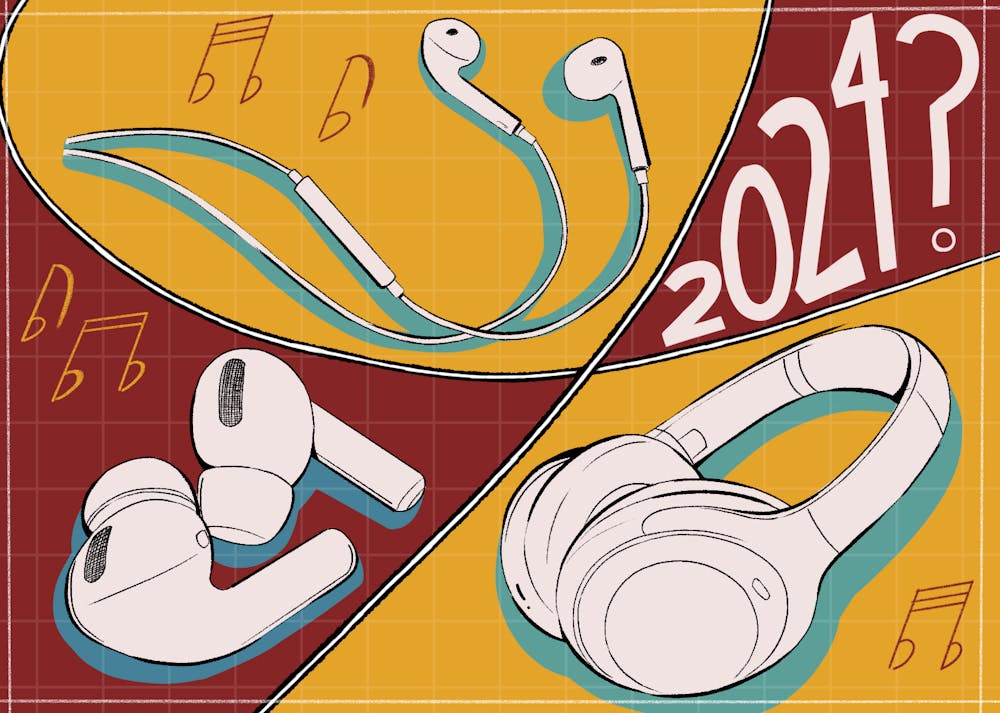AirPods. Walking around campus, it used to seem like the little wireless earbuds were in every ear of every person. Beyond listening to music, watching videos and taking calls, students used their Bluetooth earbuds to add to their outfits and signify they were fully in the study zone.
But now wireless headphones may compete with something else: the comeback of wired headphones. That's right, the extended chords of EarPods may be returning as part of a college subculture.
"I'm aware there’s an Indie subculture phenomenon where people will use wired headphones," said Jade Buzinski, a graduate student studying mathematics. "Which I think is cool, and it's a very 'vintage' thing to do."
Buzinski is an avid wired headphones user who gave up trying to use AirPods after the problems it caused her.
Wired headphones are often used as replacements for dead AirPods or Bluetooth headphones, but more people have begun using them as a priority rather than a backup.
"I used wired headphones cause they're easy, and I don't have to worry about Bluetooth," Noah Zygmunt, a freshman studying finance, said.
Bluetooth headphones often require what seems like trivial work, such as charging them and ensuring they stay in your ear without falling out. However, the tiny amounts of effort some put into making sure they can play their music can build up. With wired headphones, it’s simple — plug them into your phone and put them in your ears.
Taking calls can be more accessible, too.
"It's also fun to just speak into the microphone on wired headphones," Buzinski said.
This process is much simpler than trying to figure out which AirPod is the mic. In addition, a factor students consider can be the environmental impact wireless headphones bring to the table.
"The batteries in AirPods are irreplaceable and bad for the environment," Buzinski said. "There’s a conversation to be had about the e-waste certain products leave behind."
Wireless headphones have batteries that are hard to recycle, unlike wired headphones. Although the difference in environmental impact is minimal, the difference still exists.
Buzinski said that this is not the main reason she chooses wired headphones but that environmental impact contributes to her financial decision-making.
Hridya Puthiyaveettil, a freshman studying biomedical sciences, uses wired headphones for a different reason.
"The sound quality on wired headphones is much better than on AirPods," said Puthiyaveettil. "And you don’t have to depend on Bluetooth to work."
Zygmunt disagrees. He said he noticed no considerable change in the sound quality. Perhaps the financial factor plays a role.
"I refuse to buy AirPods 'cause they're so expensive, and I'm going to lose them," Buzinski said.
AirPods, which currently range in price from $129 to $249 on the Apple website, are hard to care for and can be damaged easily. The students said they can be accidentally put in the wash, slept on or not charged to the frequency they need to be.
Regardless, wired headphones are slowly returning to campus culture, but it may be a while before they truly become a trend.
"I feel like most people use wired headphones out of convenience," said Zygmunt. "Or they had AirPods and damaged them, so they just don't want to buy another pair."
Wired headphones are nostalgic. They remind users of when AirPods didn't exist, which was merely eight years ago, in 2016.
In a world where technology continues to advance rapidly, wired headphones may be a resistance measure to keeping our roots from a much simpler time. They are reminiscent of when things were more physical, and a thin chord connected listeners to their music.
"I love my wired (headphones)," said Zygmunt.
Perhaps it's time to see if giving up the Bluetooth connection is worth it for something that's literally down to the wire.
Edited by Sophia Braccio, Walker Smith and Angelina Steel.
Reach the reporter at gachatht@asu.edu.
Like The State Press on Facebook and follow @statepress on X.
Gokul is a sophomore studying actuarial science. This is his fourth semester with The State Press.




